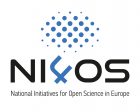March was dedicated to demonstrating the tools and their new features developed within the NI4OS-Europe project. Participants, groups/individuals from Universities, Research Infrastructures, and Research services, were informed about Open Science policies and optimal Research Data Management aspects.
On the first day, participants were introduced to the License Clearance Tool – LCT – a guided approach to the clearance of the rights (copyrights). LCT facilitates and automates the license clearance process of digital assets (datasets, software, media, and/or other rights), following the FAIR principles and especially the condition of Reusability. The tool provides two distinct workflows and a new feature of quick access to information in open source licenses:
- Resource Driven Clearance – Users associate an appropriate open-source license for existing content composed of different elements that are licensed separately or for derivative work by combining licenses from the originating licensed content and possibly nonlicensed content
- License Driven Clearance – A reverse rights clearance procedure, according to which users are given the desired license-out verifies compatibility with existing licenses-in (derivative work) or are given options for compatible licenses-in for cases of existing unlicensed content.
- License Information – Users access quickly and are informed on a set of each license element grouped into 3 main categories: Permissions, Prohibitions, and Obligations
The second day was dedicated to the legal and ethical aspects deriving from the Rules of Participation (RoP) in the European Open Science Cloud (EOSC). At first, participants were introduced to the objectives of the Initiative, as well as how to use the virtual environment and the importance of EOSC compatibility during the onboarding process of a new resource.
Next, it was covered the necessity of an automated process that covers the legal challenges of the compatibility to the EOSC. The “EOSC RoP Legal & Ethics Compliance Tool – RoLECT” comes as an answer to this addressing scientists and professionals wishing to onboard a resource to the EOSC ecosystem. More specifically, RoLECT verifies the main priorities of RoP, users follow a structured flow of questions and finally receive a report that summarizes the output for future reference. The current version launched in July 2021, and it is constantly updated with new developments according to EOSC Rules and Ethics demands.
The last presentation was RePol and its new developments and features. RePol is a free and open-source web application that allows users to design and maintain privacy and policies for a web-based service. It is addressed as a guide to deploying and customizing policies according to users’ needs. Users access the wizard and select the type of policy they want to create:
- Repository Policy – Users provide information about their repository. Not all the fields are mandatory, thus it is recommended to provide as much info as possible
- Privacy Policy – Users provide general information in a single-page form with 13 mandatory fields.
The current configuration targets repository managers, service providers, and website owners. The tool is fully aligned with the current regulations and standards of policymakers and no registration is required. After the demo presentation of the tool, participants were invited to communicate and send feedback for possible improvements via the helpdesk.
This period proved once more the significance of interactive webinars highlighting the comprehensiveness and constructiveness of the scientific communities. The NI4OS-Europe project will continue to support the training activities and collaborations. This event was supported by OpenAIRE in Greece and Cyprus and the NI4OS-Europe project. The tools are available in the NI4OS-Europe catalogue and available material to the NI4OS training platform.
